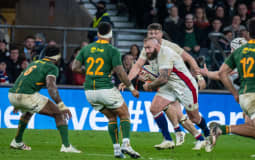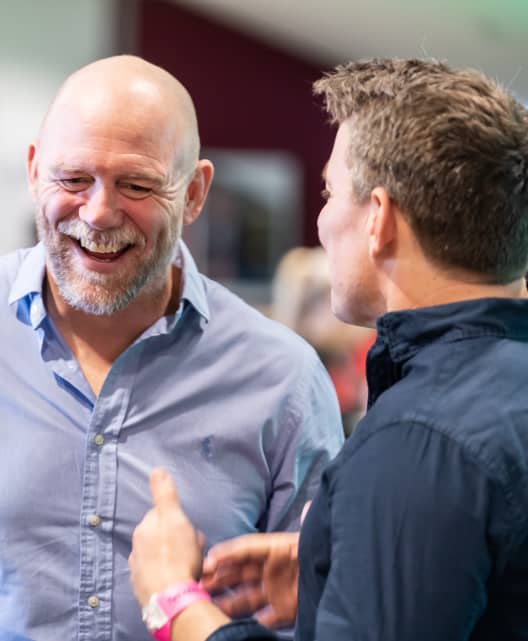You'll always miss it. I still love the game; I still love playing it
(estimated 6 minute reading time)
In an engaging session with Mike Tindall, Rugby World Cup winner and The Green Room ambassador, we discussed his fervent dedication to the sport that has shaped his life.
The Green Room – Taking you back to your early days, what was it about rugby that made you think ‘yes – this is what I want to commit myself to’?
Mike Tindall – The main reason was just competition. I loved competing against people, I loved beating people. But it was also that physicality that drove me, that was the strength that I had and it was the one advantage that I planned to use.
TGR – Where do you think that passion came from and was there anything particularly that inspired you?
MT – We were part of a very good schoolboy team. We got to play Allianz Stadium, Twickenham twice in the schoolboys, what was then the Daily Mail Cup, which is now the Continental Cup. Got to play there in two finals, and lost two. Having the occasion of playing at Allianz Stadium, Twickenham but also then having the heartache or the mental burn of losing twice at Allianz Stadium, Twickenham always spurs you on and the next time I played there was with England under-18s and then I think those sorts of memories always kick everything on.
I think walking into the Bath changing rooms in my first year as a professional in 1997 with the likes of Jeremy Guscott, Phil de Glanville, Mike Catt, Ben Clarke, Victor Ubogu, Adedayo Adebayo, Jon Callard, Matt Perry, all these guys. You get flash shots of moments of all these people that you’ve been watching on TV for the last two, three, four years. That’s sort of where the inspiration came from, you want to walk in their shoes and suddenly you’re training with them day in, day out and then you want to take their spot, so that was what I fed off.
Some people always said you can’t do it and I always used that to fuel me to prove a point that you could.
TGR – Do you think it’s essential to have that love and passion for the sport to be a top rugby player?
MT – I don’t think you win anything if you’re not passionate about it. I don’t think anyone’s a good enough player, no matter how talented to not care. I think the strength of rugby and what it delivers is about people caring, not just for what they do as a profession, but for the community, the understanding of the grassroots game, understanding where a grassroots rugby club fits into a community, and how important it is, the characters that it builds. Rugby is a sport of characters because it takes slightly interesting folk to play it. You’ve got to want to throw your body in the way of a lot of big men and have the risk of getting hurt quite often, it takes a special mindset to do that and that creates special and interesting people off it. I think that’s the characters we embrace as rugby as a sport and it’s what we should keep embracing moving forward.
TGR – Having both won Grand Slams and the Rugby World Cup in 2003, did the pressure to perform ever dampen that passion or spirit for the sport?
MT – Having those big games really sort of always tuned my mind and I enjoyed playing in those games more than anything else. It actually doesn’t matter what I’m playing, whether it’s golf, whether it’s table tennis, whatever. If it’s that will to win and the pressure, match point or whatever, or it’s to win a game of golf, that’s where I really focus my mind. I live for those occasions. It’s what separates the better players, I believe, is being able to embrace those moments and still be able to deliver, because it can also go the other way and destruct performance but I was one of those guys who just loved that moment. I preferred pressure on me more than anything else.
TGR – For all those people who will never experience what it’s like, can you describe the feeling of running out at Twickenham in front of 80,000 people?
MT – Any kid, generally anyone who’s played rugby who’s ever watched a match at Allianz Stadium, Twickenham, dreams of running out at Allianz Stadium, Twickenham, full house, preferably a Six Nations game. To have that always blows away expectations, it’s always way more than what you think it’s going to be.
Mine was 2000 against Ireland, the first game of the Six Nations. I still vividly remember the runout, standing on and doing the anthems. I didn’t sing my anthem on my first game, I felt that I just shut my eyes and listened, and listened to the anthem come back at me and took it in.
You always go through the routine of finding your mum and dad in the stand because you know roughly where they’re going to be standing or sitting. You then just get on with the game and once the game starts, you’re just playing on the pitch, it could be anywhere.
During the downtimes, when the referee blows the whistle (which in rugby is quite a lot), you can then pick up on what’s going on around you – the crowd and everything else – as you slip in and slip out. Once the game’s in flow, you’re just focused on one thing, there’s quite a lot going on in a rugby game. I think the anthem and then the actual final whistle is where, especially if you’ve won, you really soak up that atmosphere and really take in what is Allianz Stadium, Twickenham.
TGR – Since retiring have you missed that feeling and do you still lace the boots up every once in a while or have the urge to play competitively?
MT – You’re always going to want to be back on the biggest stage, playing. Every World Cup, you want to be wishing that you could be part of it. Unfortunately, in life, the game moves on, life moves on, everything moves on, athletes are better, and you have to find your peace with that. You still are always going to miss that occasion because you know you have sampled it, you know what it feels like to step on the turf in that situation. What it does to you is, whether it’s mentally or physically, how your emotions change and how you can wire yourself into it, you’ve also got to be at peace when you leave the game that you have to move on.
You’ll always miss it. I still love the game; I still love playing it. Obviously, at a far different level now, I’m a 45-year-old, old man running around now.
Where I get my enjoyment now is helping people on the field see opportunities, or putting another younger player through a hole, or even getting stepped on or beaten for pace by a young whippersnapper is a joy to me. Because if it means that they go tell a story and they’re more interested in playing rugby for longer, then I get as much enjoyment out of that as I did when I was playing. So that’s what rugby is about. You start at a grassroots level and you should finish at a grassroots level.











